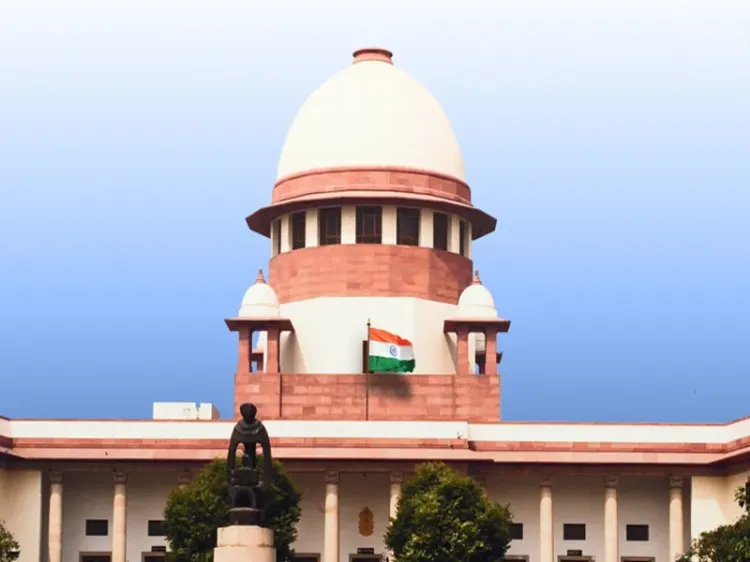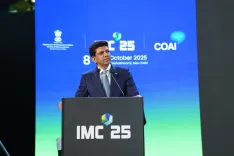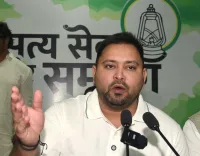Waqf Act Developments: No New Appointments or De-Notification of Current Waqfs, Centre Tells Supreme Court

Synopsis
Key Takeaways
- Supreme Court records Union government's assurance.
- No new waqf board members until further notice.
- Centre to respond to petitions in seven days.
- Numerous petitions challenge the Waqf Act amendments.
- May 5 set for next hearing on the matter.
New Delhi, April 17 (NationPress) The Supreme Court recorded the commitment made by the Union government on Thursday that no new members would be appointed to waqf boards or the Central Waqf Council under the provisions of the Waqf (Amendment) Act, 2025, until the next hearing date, and instructed it to submit its preliminary response within seven days.
The bench, led by CJI Sanjiv Khanna, noted the assurance provided by Solicitor General Tushar Mehta, the second most senior legal officer in the Centre, that the status of existing waqfs, including waqf by user, would remain unchanged.
Comprising Justices Sanjay Kumar and K.V. Viswanathan, the bench also directed the Centre to respond to petitions requesting a stay and contesting the validity of the recent amendments to the Waqf Act, 1995, within a week.
Given the numerous petitions, the apex court instructed petitioners to select five lead cases for consideration, indicating that the other petitions would be treated as applications and considered resolved.
The Supreme Court also requested its registry to rename the case as "In Re: Waqf Amendment Act".
Furthermore, it mandated the appointment of a nodal counsel to assist in filing pleadings and written submissions before the court.
The matter is expected to be revisited on May 5 for additional hearings.
During the proceedings, SG Mehta urged the apex court against issuing a stay order, asserting that the amendments were made after careful consideration of various suggestions and representations nationwide.
"The government is accountable to the populace. Numerous villages were designated as waqf. The Waqf Amendment Act, 2025 is a well-considered piece of legislation. Petitions were filed prior to Presidential assent," he remarked.
He further indicated that if the court were to stay a statutory provision, it would be an unusual step, and emphasized that an interim order would be a "harsh measure," requesting that the Centre be allowed to present its preliminary reply to elucidate the reasoning behind the amendments to the Waqf Act, 1995.
SG Mehta appealed to the top court to postpone the proceedings to permit the Centre to file its preliminary response, assuring that he would declare on behalf of the non-appearing states that any fresh appointments to a Waqf Board would be null and void.
On Wednesday, the CJI Khanna-led bench hinted at issuing an interim order but postponed proceedings after SG Mehta requested that the Union government be afforded a hearing before any such order is enacted.
Numerous petitions challenging the constitutional validity of the recent amendments to the Waqf Act, 1995 have been lodged with the Supreme Court.
Following the passage of the legislation by Parliament in the first week of April, the Congress declared its intention to contest the Waqf (Amendment) Bill (now an Act post-Presidential assent) in the Supreme Court, asserting that it undermines the fundamental structure of the Constitution and aims to "polarize" and "divide" the nation along religious lines. Conversely, the government maintains that millions of impoverished Muslims will benefit from this legislation, asserting that it does not harm any individual Muslim.
In a petition to the apex court, Congress MP and party whip in the Lok Sabha, Mohammad Jawed, argued that the amendments contravene Articles 14 (right to equality), 25 (freedom to practice and propagate religion), 26 (freedom of religious denominations to manage their affairs), 29 (minority rights), and 300A (right to property) of the Constitution. Another petition from Asaduddin Owaisi, chief of the All India Majlis-e-Ittehadul Muslimeen (AIMIM), claimed the contested amendments are "ex facie violative of Articles 14, 15, 21, 25, 26, 29, 30, 300A of the Constitution of India and manifestly arbitrary".
Additional petitions have been filed by various groups, including the Association for Protection of Civil Rights, AAP leader Amanatullah Khan, Maulana Arshad Madani from Jamiat Ulema-i-Hind, the All India Muslim Personal Law Board (AIMPLB), the Social Democratic Party of India (SDPI), the Indian Union Muslim League, Taiyyab Khan Salmani, and Anjum Kadari, challenging the constitutional validity of the provisions.
In response to the petitions seeking a stay on the implementation of the Waqf (Amendment) Act, 2025, the Union government has filed a caveat, a notice submitted to a court by a party to litigation wishing to be heard before any orders are issued on the opposing plea, in the Supreme Court. Additionally, several states governed by the BJP, including Haryana, Maharashtra, Madhya Pradesh, Rajasthan, Chhattisgarh, Assam, and Uttarakhand, have approached the Supreme Court seeking to support the Waqf (Amendment) Act, 2025.
The term ‘Waqf’, which is embedded in Islamic laws and traditions, refers to an endowment made by a Muslim for charitable or religious purposes, such as mosques, schools, hospitals, or other public institutions.









